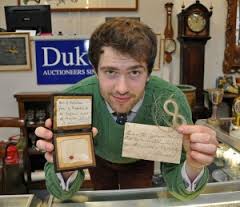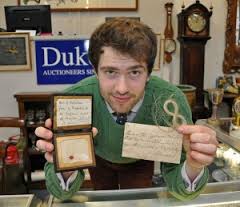Two hundred years since the Battle of Waterloo and two historical items linked to the battle are being put up for sale via auction in Dorchester, Dorset, South West England.
The two items include a lock of Napoleon’s hair and a lock of hair from a horse that took part in the battle.
The auction will take place next week and is expected to draw significant interest from military historians and war enthusiasts.
Both locks of hair are grey in colour and Napoleon’s lock is said to have been taken when he was in exile on the island of St Helena in the South Atlantic.
It was the Battle of Waterloo that sealed the fate of Napoleon and saw him being exiled from France and then Europe to the tiny island where he eventually died at the age of 51.
Napoleon Bonaparte’s grand empirical vision was to capture more and more nations within Europe and bring them under French rule. However an Allied coalition of British, the Netherlands, Prussia and Germany came together to stop Napoleon’s advance, culminating in the Battle of Waterloo in Belgium in June of 1815.
The Allies were under the command of the British Duke of Wellington and Prussia’s commander Gebhard von Blücher.
Napoleon had returned to power in France early in the year, and with many European nations opposing him they formed the coalition and began to establish troops and armaments at key locations on the border of France. Wellington and Blucher had two large groups of troops on the Belgian-France border, the Western Daily Press reports.
Napoleon decided to take the offensive and launch an attack on the massing border troops, rather than wait it out and go on the defensive. The British troops held their line against the French, but could not advance, until the Prussian troops. The Prussians attacked the right flank of the French soldiers and managed to break through. This allowed the British troops to then counter-attack head on and they drove the French troops into disarray.
The battle came to a head at the Belgian town of Wellington where more than 70,000 French troops met 40,000 coalition troops. Even Wellington admitted that it was a close-run battle.
Once the Battle of Waterloo had been won, the coalition troops marched forward into France, and King Louis the 18th was restored to the throne.
Meanwhile, Napoleon abdicated and after a failed attempt to escape France for America, the British intervened and sent him in exile to St Helena, where he lived for the remainder of his life.

